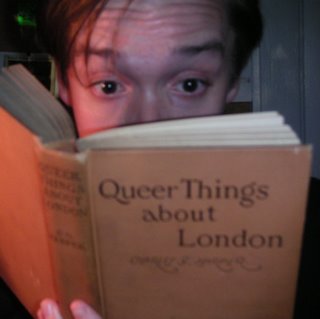A Final Post, on the occasion of the anniversary of the July 7 bombings

For the past six months I've been meaning to write something here -- a final posting, something with a sense of finality, something to sum up my experience in London, and acknowledge how it changed me. Clearly, this was too hard a task. First it seemed too soon, and then it seemed too late (and I haven't exactly been displaying the ability to write anything at all recently, to tell the truth.)
The July 7 anniversary seemed like a nice, non-arbitrary occasion to take the plunge. Because July 7 really did mark a turning point for me. It marks the moment that I began to feel like a Londoner.
I mentioned in my post about the bombings that what really got me, what made me clutch myself in fear, was the image of the bus with the roof blown off. I didn't relate, though, the time I actually cried in public: it was a week later, when I saw, near Russell Square, a poster advertising the New Issue of Time Out London, a while field with large black letters: "OUR CITY." (That magazine cover is now posted behind my desk.) It was not clear at the time -- and remains a bit unclear -- why this made me cry. And, honestly, when we're dealing with an event of faces blown off and mangled limbs, it probably would have been best to just pull myself together and repeat R—'s always-relevant mantra "It's not about you".
And yet, in the very smallest of ways, it was about me, inasmuch as it was about everyone who called London home. Of course, by July of 2005 the process of coming to feel at home in London was gradually progressing. I had met R— on May 21, B— on June 11, my dinner party on June 18, and (perhaps most importantly) my first Londonist post went up June 21. (My first post was about Lorraine Hunt Lieberson's upcoming London performance, which I missed, and now she is gone, far far too soon.)
My reaction to the July bombings says something about me, but it also says something about London. A phrase that I've been using a lot to describe my feelings about the city is "genuinely cosmopolitan." Unlike many American academics who come to Britain, I have no affective bond to the England or Englishness. But I was drawn to my sense that London really was, in certain way, in certain places, among certain people, a space beyond nationality. A place that a foreigner can feel at home without a radical identity transplant.
There are many caveats to be made, and obviously cosmopolitanism is a luxury only open to the few. And yet... the sense of living "in the world" in London isn't a simple matter of interacting with immigrants on a daily basis or having the choice of a lot of different restaurants. The sense I'm trying to get out has more to do with the news media: the British newspapers and broadcasters have many, many problems, but compared to news outlets in the US... well, there is no comparison. Consider that the newspapers the people actually read in London (let's leave out the tabs and the Standard) aren't "London" papers at all. The London papers are the national papers, and the national papers are international in remit and outlook. And the global outlook in the papers filters down to a more global vocabulary in (for lack of a better term) the public sphere. (Yeah, I know, poor choice of phrase; bear with me.)
So in returning to San Francisco from London I didn't just move from a city of seven million to a city of three-quarters of a million. As much as I love the Queen City by the Bay -- and I do -- it feels so much smaller in the mind.
It's funny, all the little things that annoyed me in London when I first arrived were pretty much still bugging me when I left. Being misunderstood, having to repeat and repeat and repeat myself, the officiousness, the "Oh you're American?"... I doubt I would ever really get over this were I to live in London longer. As I think I implied in very early posts on this blog, my first impulse, in any foreign situation is not to confront and interact, but rather to become invisible.
But Philip Larkin, in the poem "The Importance of Elsewhere," observes how comfortable being a stranger can be. The poem end with his having returned home, as I have, and observing
Here no elsewhere underwrites my existence
I'll be back to London one day. I need to get back to London.
This blog is now really, officially, over.
